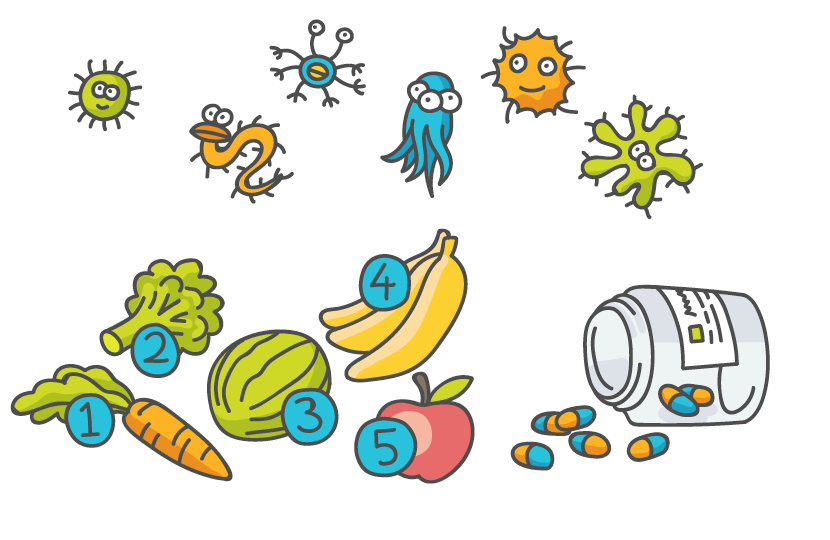Being healthy isn’t easy. With so many health myths blown out of proportion, it can be hard to know what to believe when it comes to making the right decisions for your mental and physical health. The Reset Your Health team is here to debunk some of these scary health misconceptions so that you have all the facts to make the right wellbeing choices.
All bacteria are bad?
Bacteria have a bad rep, and who can be surprised when we feel the need to douse our kitchen and bathroom surfaces in antibacterial cleaners that claim to be 99.9% effective? We’re conditioned from a young age to wash our hands religiously so that we don’t become ill from the pesky bacteria plaguing our society, so it’s hardly surprising this is one of the most common of all health misconceptions.
However, bacteria are incredibly important to our bodies. They provide 15% of our required calories by breaking down food that our body can’t do itself. Studies show that the more diverse the bacteria in the gut, the better your human health! The bacteria diversity in the gut often decreases before the onset of inflammatory conditions so to stay healthy, it is important to introduce more good bacteria into your body.
Dieting makes me healthier?
Calorie counting is something that we’ve all tried at some point in our lives. Every time we opt for the lower calorie option, we are relying on an outdated guide to nutrition. Calories don’t tell us anything about the nutritional value in a certain food! Plus, the number of calories you need is based on your own personal circumstances. So it’s better for you to have a healthy diet consisting of minimally processed wholegrains, fruit, veg and healthy fats – regardless of their calorie score – rather than one of processed junk food!
The more recent fad has been the turn to low fat diets. This is based on the connection between the % consumption of fat and coronary heart disease. There are actually different types of fat, and not all of them are bad. Don’t worry about the unsaturated fats in vegetables oils, fish and nuts. Do watch out for the saturated fats in meat and butter – these are linked to increased cholesterol levels, which are linked to heart conditions.
Everyone knows a sugary diet is linked to tooth decay, hyperactivity, weight gain and type II diabetes. But you’ll be relieved to hear that having a healthy diet doesn’t mean cutting out sugar completely. If you have a sweet tooth then don’t feel guilty about indulging in fruits, dates and a couple of pieces of dark chocolate (now and then!). Dark chocolate is packed with beneficial minerals and vitamins like potassium, iron, zinc and carbon. But beware! Milk chocolate has almost no nutritional value so won’t have the same health benefits.
The truth about 5-a-day?
One of the more common health misconceptions is that you should always have 5-a-day, but you should actually aim to have half of your plate to be fruit and vegetables – 5 just isn’t enough (although it is a great start)! They are the superstars to a balanced diet, and carry many health benefits to those who eat them regularly.
Yet certain fruit and vegetables are richer in nutrients than others, known as ‘superfoods’. Some of these include:
- Blueberries – these contain anthocyanins that are believed to promote cardiovascular health. Their high fibre content also helps to prevent constipation.
- Broccoli – is high in vitamin to help the body fight infection, and also contains sulforaphane that helps to prevent colon cancer.
- Onions – contain compounds that lower blood pressure by helping to thin the blood.
So next time you’re doing the weekly shop, try picking some of these superfoods up to incorporate into your meals and boost your health. Try and surpass the 5-a-day to give your body the vitamins and nutrients is needs.
Also reflect on where you are getting your fruit and vegetables from and how prone they are to contamination by pollutants. Organically-bought produce contain only 30% the pesticide residue of conventionally grown produce, and have more nutrients. Something to consider!
Pills are the answer to your health problems?
Modern medicine is miraculous, there’s no doubt about that. Without vaccinations, antibiotics, and gene therapy, the health of the human population would be in a very different state. Don’t be fooled by these drugs though, they often mask the reality that your body is not in a healthy state, and address the symptoms rather than the cause of the problem.
So it’s time to change. A functional route is the long-term key to a healthier body, and means becoming proactive and making changes to your lifestyle. This might include daily changes to the food you eat, the nutrition you intake and the level of physical activity you exert. This will increase the standard of your wellbeing and addresses the route cause of a number of chronic conditions. Let’s work towards improving our own wellbeing through the daily choices we make.
So, what now? Don’t believe everything you are told when it comes to your health. A lot of health misconceptions are out there and the media tends to manipulate and distort certain health ‘facts’. If you are interested in making some of the changes to your diet suggested in this article, then take a look at the Reset Your Health plan, which helps you to improve your health through making simple changes to your diet
